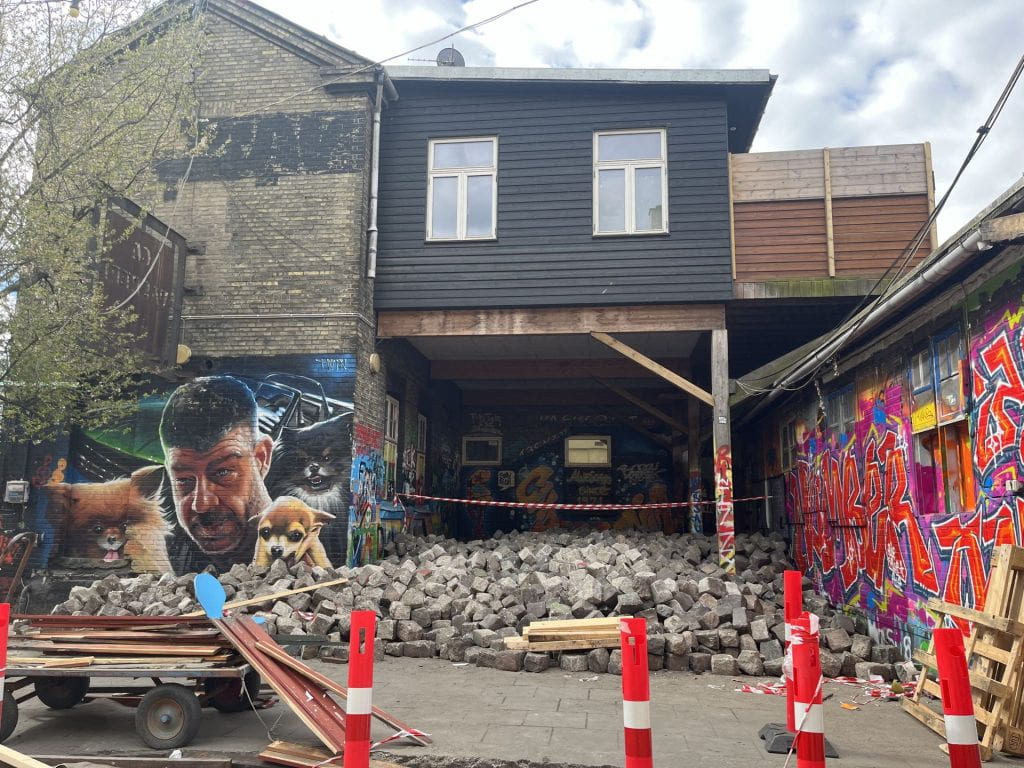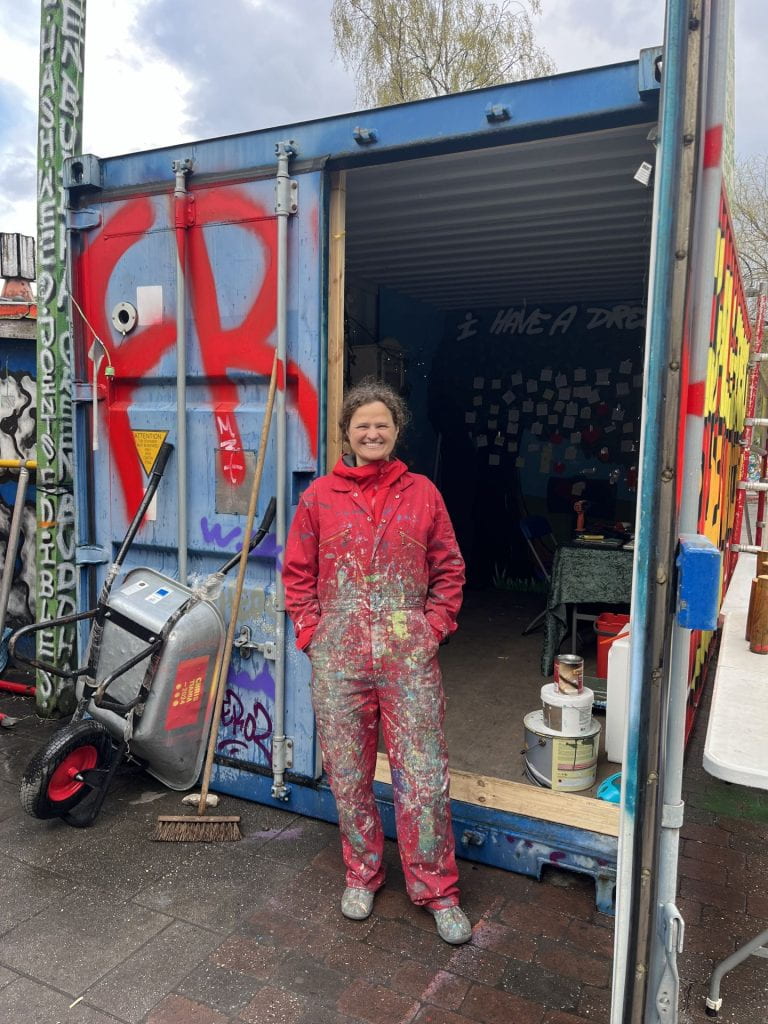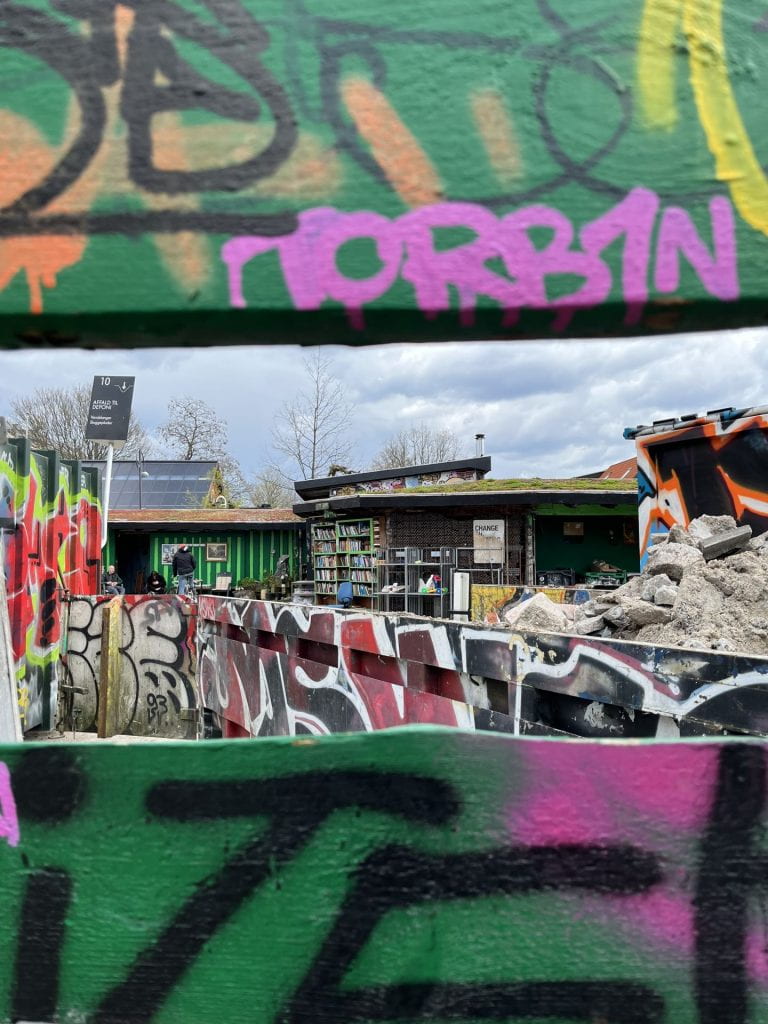By Mara Balaita and Sanne Grefelman
On April 6th, you could’ve read all over the news that Pusher Street, the main street of Christiania, the Free Town of Copenhagen was shut down after almost 50 years of cannabis trade, consumption of substances, and deadly shootings. Known as former army barracks taken by the hippies in the 1970s,Christiania is a place where people work and live alternatively, free from authority. This “town” has its own rules, waste system, school, and community-based administration.
We went to Christiania after closing Pusher Street to have a clearer perspective on the upcoming events that come with this situation. Instead of this, we found Leah Robb, a 46-year-old artist, half Danish half Scottish, working near a painted container. We stopped and discussed with her about the community from the heart of Copenhagen, known for its alternative lifestyle and drug culture.
Leah came in 2008 to Christiania to work on a portrait project. During her project, she got to know more about the people living here.
So when I first came to see Christinia, I was just thinking it would be a bunch of zombies walking around, totally stoned out their heads, because that was the big picture I got of Christiania, before I came here. When I discovered people actually talked and sounded like they made sense, I was quite surprised. People are misjudged because I was one of them who misjudged people before I came here. When I arrived I met many people and I also felt some of the friendliness and the opportunity to just talk to people randomly in the street and be greeted in the street.
The word freedom might define Christiania as a whole. The rumors behind the stories about it oscillate between creative ways of expressing yourself and dangerous situations that can trigger and attract everyone’s attention.
Right at the beginning, Christiania was almost like a free for all, everyone could just come and start to build their own home or there were sleeping areas. Little by little like in more or less any other situation, people get more established, people find themselves having a home that they call theirs. So it changes. Concrete suffices, becoming more established. And there’s also been stages, where, for example, I can’t remember what years it was, maybe late 70s, there was suddenly a lot of heroin or opium heroin that came to Christina and I heard that 25 young people died pretty much within a very short period. And that was when they were like, okay, this stuff is a killer.
Through her perspective, we discovered that this place has a lot more to offer. Discussing with Leah, we found out about the importance of self-organization, highlighting the need for outside support to address violence and organized crime. She raises concerns about misconceptions and the need for the government and other organizations to learn from Christiania’s unique model of self-governance.
Here you had a lot to offer for the outside world, and it was absolutely not a place that you should just close down and throw away. It can teach the government, it can teach other people and different organizations a lot. Because the way that they try to organize themselves, you know, they don’t have a leader, they have a meeting, and it’s the meeting that is the highest authority.
As an artist, Leah recently made an exhibition about addiction inspired by people she knew and cared about from Christiania. The exhibition is called: “My Beloved Addiction”. Recently she showed her exhibition in Aarhus, in Kulturhus Bunkeren, and DOKK1. She tried to build a bridge between an addict and the world around them.
She additionally contributes to the community’s growth through her art, which she also seeks to share with others.
I’m at the moment trying to create an area where people can play darts and I was thinking it would be nice with a place where people can do that with training. And it should be possible to eat together out here and have a market with second-hand things. There are lots of lots and lots of opportunities, also for art artists to come here and pre artworks, maybe outdoors as well.
We talked about the consumption of substances, concluding that it can become “a waste of your emotional values because you kind of dulled yourself down a bit. It can have repercussions on your life and your growth as a human being.”
Even though she has witnessed many people in her environment struggling, she doesn’t encourage this type of behavior. The consumption of substances can accelerate and it can develop into other kinds of problems, the situation getting out of control.
But the actual smoking of something or drinking that’s a sighted subject compared to the violence and organized crime that is living here. And it was like a cancerous cell or a cancerous tumor in Christiania. So it got to the point where it was just not it was not possible to control what was happening.
To end the conversation with Leah on a more positive note, we asked her how she sees Christiania develop in the next few years.
In some ways, there’s more hope now than there’s ever been for change. But there are also some, who’re afraid that businesses will lose, because even though it was bad for business, it was also good for business. Bad for business, because tourists are starting to be afraid of coming. It was good for business, because every time the police came and cleared streets, somebody had a painting job to repaint the booths, as the green Hall would get people to come over and buy materials from there.
We said goodbye to Leah and the enigmatic ambiance of the Free Town of Copenhagen, leaving with a better insight about Christina’s creative heart and their remarkable community.


